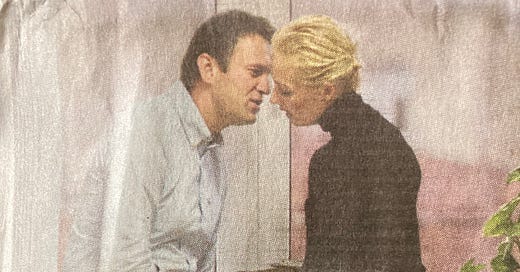There can be no better use of your time than watching the Oscar-winning documentary “Navalny,” as my wife and I did last week when it was shown on CNN, the day after his death. (It’s now streaming on Max).
Like most people, we had known about Aleksei Navalny and his brave battle to counter the brutal autocratic regime of Russian President Vladimir Putin. But this film captures his passion, his humanity, his charisma and his sense of humor.
There is much to learn from this man and much to emulate. We Americans, numbed by discouraging national and world events, should heed what Navalny wrote on Facebook Jan. 17, the third anniversary of his arrest.
“I don’t want to give up either my country or my beliefs. I cannot betray either the first or the second. If your beliefs are worth something, you must be willing to stand up for them. And if necessary, make some sacrifices.”
The documentary recounts Putin’s first attempt to murder Navalny: on Aug. 20, 2020 he fell violently ill and went into a coma aboard a flight from Siberia. For two days Russian authorities resisted the pleas of his wife, Yulia, to transfer him to Germany for treatment. Finally he was allowed to go to Berlin; doctors there announced he had been poisoned with a nerve agent known to be used by the Russian government against its opponents.
After he recovered he took the ultimate risk of returning to Russia, though knowing he faced almost certain arrest, a long imprisonment and with it, death. He said he loved his country and could not bear to live in exile. “There is no other option,” he said. “I have to go home and fight with my fellow Russians, fight for our homeland.”
Putin did not wait; Navalny was arrested at the airport, shortly after his arrival. In August 2023 he was sentenced to 19 years in prison for “extremism.”
In December of last year he disappeared, swallowed up in the Kafkaesque web of the Russian penal system. Twenty days later Navalny’s spokesman announced he had been located in Polar Wolf, a remote prison in the Arctic.
The next day Navalny, defiant and amusing as always, posted this message: “I’m your new Santa Claus. I don’t say ‘Ho-ho-ho’ but I say ‘Oh-oh-oh’ when I look out the window, where there is night, then evening, then night again.”
After Navalny’s death the New Haven Register’s Susan Campbell wrote a column revealing that Navalny lived in my city, New Haven, in 2010. He was here as a member of the Yale World Fellows, a program that brings together emerging leaders in hopes of “increasing their capacity to make the world a better place.”
Holy cow! Navalny was here. Could it be that I passed the great man on the streets of New Haven? Sat near him at an off-campus coffee shop?
Emma Sky, who directs the Yale World Fellows program, said “We will remember his unflagging courage and his selfless sacrifice — and also his mischievous grin, his sense of humor and his devotion to his family.”
Yes, he was devoted to his wife, his daughter and his son, But they understood why, in January 2021, after his health was restored, he had to leave them and return to Russia.
Now his widow has vowed to carry on that fight. Maybe she will not return to Russia but she knows how to use worldwide social media. She was on YouTube last Monday to declare: “I am going to continue the work of Aleksei Navalny and continue to fight for our country. I call on you to stand beside me, to share not only in the grief and endless pain that has enveloped us and won’t let go. I ask you to share my rage — to share my rage, anger and hatred of those who have dared to kill our future.”
This is not just a political saga — this is a love story. Three years ago, as he was being sentenced, he stood smiling in the courtroom, drawing a heart for her on the glass cage that separated them.
And this was his final post to her on Valentine’s Day: “Darling, everything is like the song with you: Between us there are cities, the lights of airfields, blue snowstorms and thousands of kilometers. But I feel that you are near every second and I love you more and more.”
The song he quoted, “Hope, My Earthly Compass,” carries this refrain: “Hope is my compass, and success is a reward for courage.”
At the end of the documentary, filmmaker Daniel Roher asks Navalny what message he would leave for the Russian people if he were to be killed. He replies: “You’re not allowed to give up. If they decide to kill me, it means that we are incredibly strong. We need to utilize this power to not give up, to remember we are a huge power that is being oppressed by these bad dudes.”
Navalny takes a breath, then adds: “The only thing necessary for the triumph of evil is for good people to do nothing. So don’t be inactive.”





Thanks, Cousin!
Excellent article Randy.